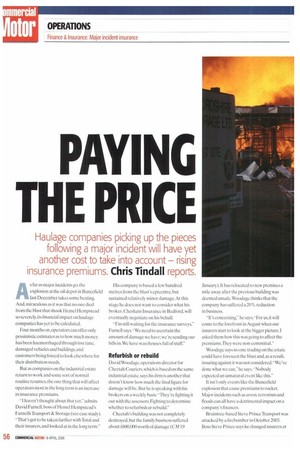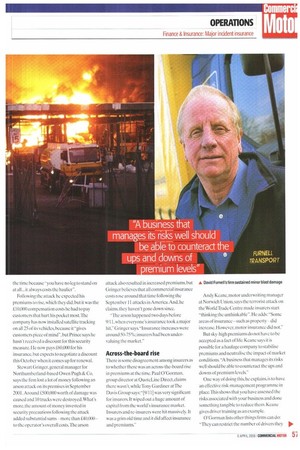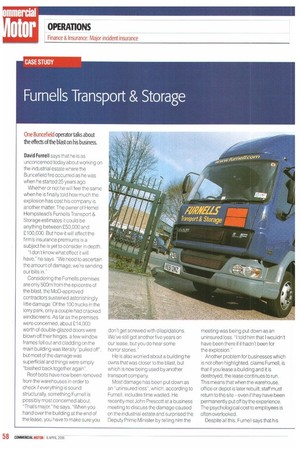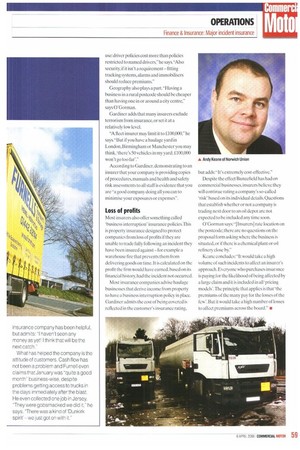PAYING THE PRICE
Page 56

Page 57

Page 58

Page 59

If you've noticed an error in this article please click here to report it so we can fix it.
Haulage companies picking up the pieces
following a major incident will have yet
another cost to take into account — rising insurance premiums. Chris Tindall reports.
As far as major incidents go, the explosion at the oil depot in Buncefield last December takes some beating. And, mi raculous as it was that no one died from the blast that shook Hemel Hempstead so severely, its financial impact on haulage companies has yet to be calculated.
Four months on, operators can offer only pessimistic estimates as to how much money has been haemorrhaged through lost time, damaged vehicles and buildings, and customers being forced to look elsewhere for their distribution needs.
But as companies on the industrial estate return to work and some sort of normal routine resumes, the one thing that will affect operators most in the long term is an increase in insurance premiums.
"I haven't thought about that yet," admits David Furnell, boss of Hemel Hempstead's Furnells Transport & Storage (see case study). "That's got to he taken further with Total and their insurers, and looked at in the long term." His company is based a few hundred metres from the blast's epicentre, but sustained relatively minor damage.At this stage he does not want to consider what his broker, Chesham Insurance in Bedford, will eventually negotiate on his behalf.
"I'm still waiting for the insurance surveys," Furnell says. 'We need to ascertain the amount of damage we have; we're sending our bills in .We have warehouses full of stuff."
Refurbish or rebuild
David Woodage. operations director for Cheetah Couriers, which is based on the same industrial estate, says his firm is another that doesn't know how much the final figure for damage will be. But he is speaking with his brokers on a weekly basis. "They're fighting it out with the assessors. Fighting to determine whether to refurbish or rebuild."
Cheetah's building was not completely destroyed, but the family business suffered about f.600,000 worth of damage (CM 19 January). It has relocated to new premises a mile away after the previous building was deemed unsafe.Wooclage thinks that the company has suffered a 20% reduction in business.
"It's concenting," he says."For us, it will come to the forefront in August when our insurers start to look at the bigger picture. I asked them how this was going to affect the premiums.They were non-committal."
Wordage says no one trading on the estate could have foreseen the blast and, as a result, insuring against it was not considered."We'vc done what we can," he says. "Nobody expected an unnatural event like this."
It isn't only events like the Buncefield explosion that cause premiums to rocket. Major incidents such as arson, terrorism and floods can all have a detrimental impact on a company's finances.
Braintree-based Steve Prince Transport was attacked by a firebomber in October 2003. Boss Steve Prince says he changed insurers at the time because "you have no leg to stand on at all...it always costs the haulier".
Following the attack he expected his premiums to rise, which they did, but it was the £10,000 compensation costs he had to pay customers that hurt his pocket most.The company has now installed satellite tracking on all 25 of its vehicles, because irgives customers piece of mind", but Prince says he hasn't received a discount for this security measure. lie now pays £60,000 for his insurance, but expects to negotiate a discount this October when it comes up for renewal.
Stewart Gringer,general manager for Northumberland-based Owen Pugh & Co, says the firm lost a lot of money following an arson attack on its premises in September 2001. Around £500,000 worth of damage was caused and 10 trucks were destroyed.What's more. the amount of money invested in security precautions following the attack added substantial sums— more than £40,000 — to the operator's overall costs. The arson attack also resulted in increased premiums, but (1 ringer believes that all commercial insurance costs rose around that time following the September 11 attacks in America.And,he claims, they haven't gone down since.
"The arson happened two days before 9/11, when everyone's insurance took a major hit," Gringer says. "insurance increases were around 50-75%; insurers had been undervaluing the market."
Across-the-board rise
There is some disagreement among insurers as to whether there was an across-the-board rise in premiums at the time. Paul O'Gorman. group director at QuoteLine Direct, claims there wasn't, while Tony Gardiner at The Davis Group says: 19/11] was very significant for insurers. It wiped out a huge amount of capital from the world's insurance market. Insurers and re-insurers were hit massively. It was a grim old time and it did affect insurance and premiums." Andy Keane, motor underwriting manager at Nonvich Union, says the terrorist attack on the World Trade Centre made insurers start "thinking the unthinkable". He adds: "Some areas of insurance —such as property — did increase. However, motor insurance did not."
But sky-high premiums do not have to be accepted as a fact of life. Keane says it is possible fora haulage company to stabilise premiums and neutralise the impact of market conditions. "A business that manages its risks well should be able to counteract the ups and downs of premium levels."
One way of doing this, he explains, is to have an effective risk-management programme in place.This shows that you have assessed the risks associated with your business and done something tangible to reduce them. Keane gives driver training as an example.
O'Gorman lists other things firms can do: "They can restrict the number of drivers they David Furnell says that he is as unconcerned today about working on the industrial estate where the Buncefield fire occurred as he was when he started 25 years ago.
Whether or not he will feel the same when he is finally told how much the explosion has cost his company is another matter. The owner of Hemel Hempstead's Furnells Transport & Storage estimates it could be anything between £50,000 and E100,000. But how it will affect the firm's insurance premiums is a subject he is yet to consider in depth.
"I don't know what effect it will have," he says. "We need to ascertain the amount of damage; we're sending our bills in."
Considering the Furnells premises are only 500m from the epicentre of the blast, the MoD-approved contractors sustained astonishingly little damage. Of the 100 trucks in the lorry park, only a couple had cracked windscreens. As far as the premises were concerned, about 214,000 worth of double-glazed doors were blown off their hinges. a few window frames fell out and cladding on the main building was literally "pulled off", but most of the damage was superficial and things were simply "bashed back together again".
Roof bolts have now been removed from the warehouses in order to check if everything is sound structurally, something Furnell is possibly most concerned about. "That's major," he says. "When you hand over the building at the end of the lease, you have to make sure you don't get screwed with dilapidations. We've still got another five years on our lease, but you do hear some horror stories."
He is also worried about a building he owns that was closer to the blast, but which is now being used by another transport company.
Most damage has been put down as an ''uninsured loss", which, according to Furnell, includes time wasted. He recently met John Prescott at a business meeting to discuss the damage caused on the industrial estate and surprised the Deputy Prime Minister by telling him the meeting was being put down as an uninsured loss. "I told him that I wouldn't have been there if it hadn't been for the explosion."
Another problem for businesses which is not often highlighted, claims Furnell, is that if you lease a building and it is destroyed, the lease continues to run. This means that when the warehouse, office or depot is later rebuilt, staff must return to the site even if they have been permanently put off by the experience. The psychological cost to employees is often overlooked.
Despite all this, Furnell says that his insurance company has been helpful, but admits: "I haven't seen any money as yeti lthinkthatwill be the next catch."
What has helped the company is the attitude of customers. Cash flow has not been a problem and Furnell even claims that January was "quite a good month" business-wise, despite problems getting access to trucks in the days immediately after the blast. He even collected one job in Jersey. "They were gobsmacked we did it," he says. "There was a kind of 'Dunkirk spirit' we just got on with it." use: driver policies cost more than policies restricted to named drivers," he says. "Also security, if it isn't a requirementfitting tracking systems, alarms and immobilisers should reduce premiums."
Geography also plays a part. "Having a business in a rural postcode should be cheaper than having one in or around a city centre," says O'Gorman.
Gardiner adds that many insurers exclude terrorism from insurance, or set it at a relatively low level.
"A fleet insurer may limit it to £100,000," he says. "But if you have a haulage yard in London, Birmingham or Manchester you may think, 'there's 50 vehicles in my yard; £100,000 won't go too far'."
According to Gardiner. demonstrating to an insurer that your company is providing copies of procedures, manuals and health and safety risk assessments to all staff is evidence that you are "a good company doing all you can to minimise your exposures or expenses".
Loss of profits
Most insurers also offer something called 'business interruption' insurance policies.This is property insurance designed to protect companies from loss of profits if they are unable to trade fully following an incident they have been insured against -for example a warehouse fire that prevents them from delivering goods on time. It is calculated on the profit the firm would have earned, based on its financial history, had the incident not occurred.
Most insurance companies advise haulage businesses that derive income from property to have a business interruption policy in place. Gardiner admits the cost of being covered is reflected in the customer's insurance rating, but adds:"It's extremely cost-effective."
Despite the effect Buncefield has had on commercial businesses, insurers believe they will continue rating a company's so-called 'risk' based on its individual details. Questions that establish whether or not a company is trading next door to an oil depot are not expected to be included any time soon.
O'Gorman says:[Insurersj rate location on the postcode; there are no questions on the proposal form asking where the business is situated, or if there is a chemical plant or oil refinery close by."
Keane concludes:It would take a high volume of such incidents to affect an insurer's approach. Everyone who purchases insurance is paying for the likelihood of being affected by a large claim and it is included in all 'pricing models'.The principle that applies is that 'the premiums of the many pay for the losses of the few'. But it would take a high number of losses to affect premiums across the board."
































































































































































































